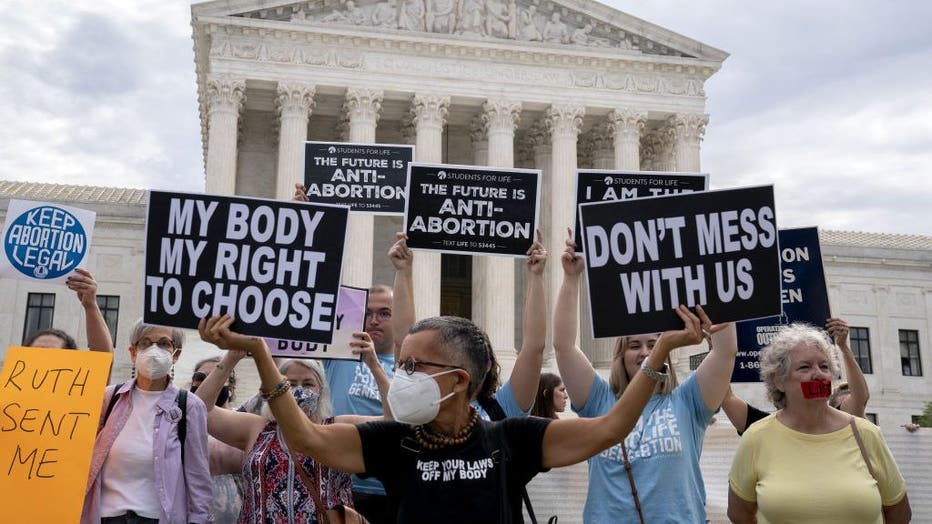U.S. Supreme Court takes up Texas law banning most abortions
U.S. Supreme Court takes up Texas law banning most abortions
The Supreme Court is taking up challenges to a Texas law that has virtually ended abortion in the nation's second-largest state after six weeks of pregnancy, with at least one conservative justice who let the law take effect raising questions about its novel structure.
WASHINGTON - The Supreme Court is taking up challenges to a Texas law that has virtually ended abortion in the nation's second-largest state after six weeks of pregnancy, with at least one conservative justice who let the law take effect raising questions about its novel structure.
The justices are hearing arguments Monday in two cases over whether abortion providers or the Justice Department can mount federal court challenges to the law, which has an unusual enforcement scheme its defenders argue shields it from federal court review.
Justice Brett Kavanaugh, who previously allowed the law to take effect in September in a decision that split the court 5-4, suggested that the unusual enforcement scheme could be problematic.
"There's a loophole that's been exploited here, or used here," he said, explaining that the question for the court is whether to "close that loophole." Kavanaugh suggested that the "principle" and "whole sweep" of a 1908 Supreme Court case would "suggest extending the principle here, arguably" and closing the loophole.
Five conservative justices, including three who were appointed by President Donald Trump, were in the majority letting the law take effect. Chief Justice John Roberts joined the court's three liberal justices in dissent.
In neither case the Supreme Court was hearing Monday is the right to an abortion directly at issue. But the motivation for lawsuits filed by abortion providers and the Justice Department is that the Texas law conflicts with landmark Supreme Court rulings that prevent a state from banning abortion early in pregnancy.
RELATED: Supreme Court doesn't block Texas abortion law, sets hearing
Arguing for the United States, Solicitor General Elizabeth Prelogar told the justices that Texas' law was enacted in "open defiance" of Supreme Court precedent. "It enacted a law that clearly violates this court's precedents," she said.
Under the Supreme Court's 1973 Roe v. Wade decision and 1992 Planned Parenthood v. Casey decision, states are prevented from banning abortion before viability, the point at which a fetus can survive outside the womb, around 24 weeks of pregnancy.

Pro-choice activists hold signs outside the U.S. Supreme Court in Washington, D.C., U.S., on Monday, Oct. 4, 2021. (Photographer: Stefani Reynolds/Bloomberg via Getty Images
The justices will hear a separate challenge to those decisions in a case over Mississippi's ban on abortion after 15 weeks. Those arguments are set for Dec. 1.
Justice Elena Kagan told Judd E. Stone II, arguing for Texas, that until Texas passed its law, "no state dreamed" of trying to make an end-run around Supreme Court precedent in the same way.
If the Supreme Court doesn't do anything about that, she said, it would be inviting states to try to flout precedent: "Guns. Same-sex marriage. Religious rights. Whatever you don't like: go ahead," she said. Kagan, who disagreed with her colleagues' decision to let the law take effect, said Texas' law has prevented women in Texas "from exercising a constitutional right."
The Texas law has been in effect since September when the Supreme Court declined to intervene, except for a 48-hour period in early October when it was blocked by a lower court. The high court got involved again less than two weeks ago, moving at extraordinary speed. The court offered no explanation for its decision to hear the cases so quickly.
The Texas ban, signed into law by Gov. Greg Abbott in May, prohibits abortion after cardiac activity is detected in a fetus, usually around six weeks and before some women know they are pregnant. The law makes exceptions for medical emergencies but not for rape or incest.
At least 12 other states have enacted bans early in pregnancy, but all have been blocked from going into effect.
Rather than have state officials enforce the law, Texas deputizes private citizens to sue anyone who performs or aids and abets an abortion. If someone bringing suit is successful, they are entitled to at least $10,000. Women who obtain abortions can't be sued under the law.
During arguments Monday, Roberts at one point asked whether the law could be challenged if Texas had made the entitlement much higher, $1 million. Texas' lawyer told him no.
The structure of the law threatens abortion providers with huge financial penalties if they violate it. Clinics throughout the state have stopped performing abortions once cardiac activity is found.
The result, both the providers and the Biden administration said, is that women who are financially able have traveled to other states and those without the means must either continue their pregnancies against their will or find other, potentially dangerous ways to end them.
The state and Jonathan Mitchell, an architect of the law, say in their briefs that the providers and the Justice Department lack the right to go into federal court and can't sue state judges and clerks who are not responsible for enforcing the abortion ban. They also contend that there is no effective way of blocking the law, in part because federal courts can't force state judges to abstain from hearing the lawsuits the law authorizes.
Constitutional Attorney David Coale pointed to Justice Kavanuagh's "what if" scenarios. For example, the same type of state law being used to limit federal gun rights.
"There were a lot of questions from conservative judges on the court about what happens if this framework were applied to other laws. What boundaries are there on this framework? We don’t know how they're gonna vote, but people were definitely uncomfortable with the idea that Texas legislature just sort of waved away the federal part," Coale said
RELATED: Texas urges Supreme Court to leave abortion law in place

